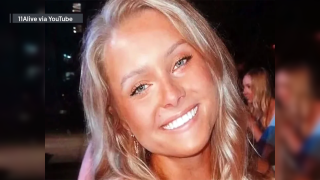
A 22-year-old college student had to be put on life support after suffering a brain hemorrhage during a spring break trip to Mexico.
Liza Burke, a senior at the University of Georgia, traveled to Cabo San Lucas with her friends and experienced a medical emergency, NBC affiliate 11Alive, a local station in Atlanta, Georgia, reported on March 13.
WATCH ANYTIME FOR FREE
>Stream NBC10 Boston news for free, 24/7, wherever you are. |
While eating breakfast with her friends on March 10, Burke said she had a headache and returned to her hotel room to sleep. Her friends later arrived and called for help after they were unable to wake Burke.
The student was then taken to a local hospital where she was diagnosed with arteriovenous malformation, which caused her to suffer a brain hemorrhage, a statement on Burke’s GoFundMe page said.
Get updates on what's happening in Boston to your inbox. Sign up for our >News Headlines newsletter.
“She is currently on life-support. Her family and doctors are working hard to give her the best medical treatment possible,” the statement posted on March 13 read.
On March 14, the NBC affiliate reported that Burke had been transported to the United States. She is being treated at the Mayo Clinic in Jacksonville, Florida. Burke’s parents are also at the hospital with their daughter.
Mother Laura McKeithen told 11Alive the medical team is hopeful her daughter will recover.
Health
“They were planning on taking her for an MRI, perhaps some other tests, maybe an echocardiogram,” McKeithen said.
She added, “They said it would be a pretty good time before we really have a sense of what’s going on.”
Doctors said the 22-year-old had a stroke in the middle of her brain, according to her mother.
“So in terms of places for it to bleed, it’s not the best, but it’s not the worst thing,” Burke’s mom said. “I’m just glad to be at a competent hospital that has all the equipment that they need and the experience to take care of her.”
According to 11Alive, Burke’s sister died in 2008 after battling a rare genetic disorder. McKeithen described Burke’s current situation as her “worst fear because I’ve had it happen before.”
But she is attempting to remain patient as she awaits news about her daughter’s medical emergency.
“However long it takes,” she said, “as long as she is on the mend.”
Burke seems to be showing signs of improving. McKeithen shared: “I started talking to her and asked her to squeeze my hand. She squeezed my hand. The intensive care unit pretty much lit up. At that point, everyone was very happy.”
She also expressed gratitude for the donations the family has received through Burke’s GoFundMe page. The page has exceeded its goal of $40,000 and has currently raised more than $140,000.
On the page, organizer Jennifer Ritter, one of Burke's friends, wrote that Burke “has so much left to give to the world.”
“Please continue to pray for her full recovery,” Ritter said.
McKeithen asked for prayers as well. “So far, all that energy that is out there in the universe seems to be working for her, so I would say keep doing whatever people are doing,” she told the NBC affiliate.
The proud mom praised Burke and said, “She is the best daughter you could ever have.”
Arteriovenous malformations, also known as AVMs, occur when blood vessels become entangled and incorrectly connect to arteries and veins, preventing blood flow and oxygen circulation, according to the Mayo Clinic.
The blood vessels can weaken or rupture, which leads to bleeding in the brain, stroke or brain damage.
According to Johns Hopkins Medicine, “Most people with AVMs have no initial symptoms or problems.” Medical experts are not sure what causes arteriovenous malformations to happen.
This story first appeared on TODAY.com. More from TODAY



